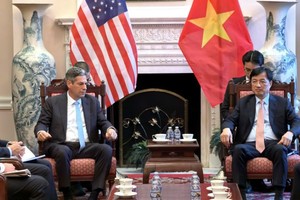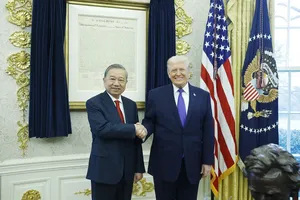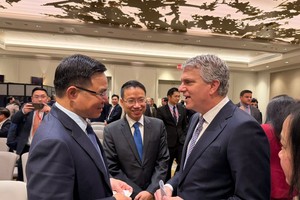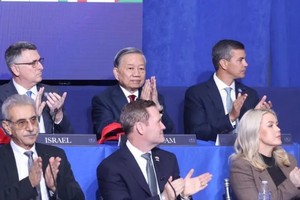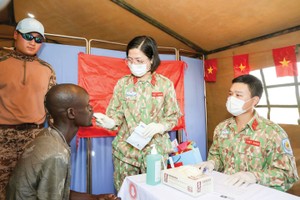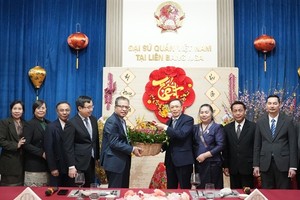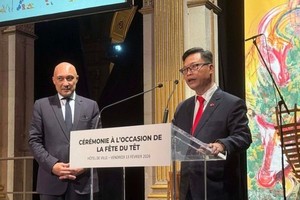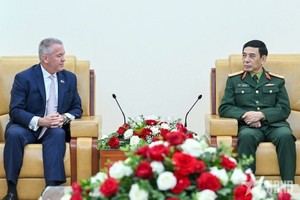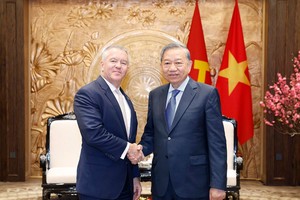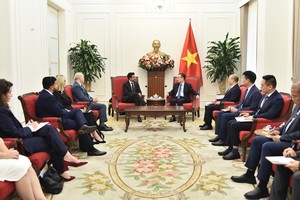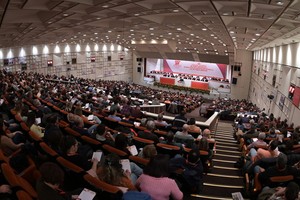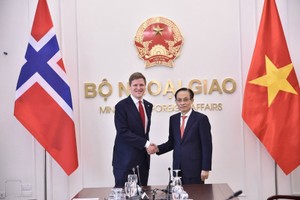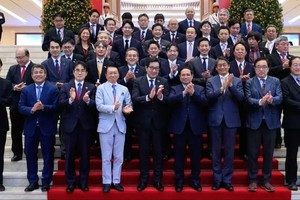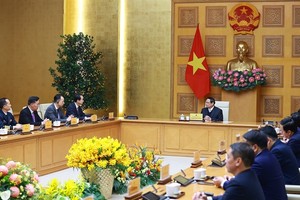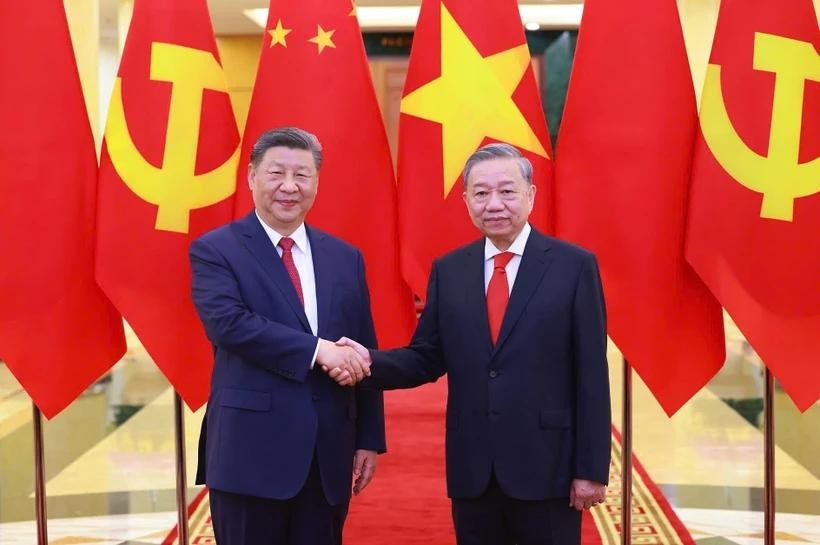
General Secretary of the Communist Party of Vietnam (CPV) Central Committee To Lam held talks with General Secretary of the Communist Party of China (CPC) Central Committee and President of China Xi Jinping in Hanoi on April 14 afternoon.
At the talks, which took place right after the official welcome ceremony for the Chinese leader, General Secretary Lam welcomed Xi’s state visit, noting its significance during the Year of Vietnam-China Humanistic Exchange and the 75th anniversary of diplomatic relations.
The Vietnamese leader expressed confidence that the visit would mark a new milestone in the enduring friendship between the two Parties and nations, contributing to further deepening the Comprehensive Strategic Cooperative Partnership and advancing the building of a Vietnam-China community with a shared future that carries strategic importance.
In response, Xi expressed his joy at returning to Vietnam - both "a comrade and a brother" - just over a year since his last visit. He highlighted the visit’s timing that coincides with Vietnam’s celebrations of the 95th anniversary of the Communist Party of Vietnam (CPV), the 80th anniversary of the nation’s founding, and the 50th anniversary of the liberation of the South and national reunification.
Xi noted that choosing Vietnam as the first destination for his overseas visits this year reflects the high value the Chinese Party and State place on bilateral relations as well as the deep bond shared by the two countries.
The Chinese leader expressed readiness to engage in in-depth discussions with Party General Secretary Lam and other key Vietnamese leaders to discuss orientations and measures to foster the traditional friendship and shape a vision for the building of the China–Vietnam community with a shared future that carries strategic importance, guided by six major orientations.
As comrades and brothers, China and Vietnam stand united and cooperate closely on the path of socialist modernisation in each country, moving forward together, striving for the happiness of their peoples, and contributing more to human progress, he affirmed.
General Secretary To Lam said the Vietnamese Party and State believe in and support Xi’s continued leadership in steering China toward sustained development and achieving its second centenary goal, while playing an increasingly important role in promoting peace, cooperation, and development in the region and around the world.
Fostering relations with China remains an objective requirement, a strategic choice, and a top priority in Vietnam’s overall foreign policy, he noted.
On this occasion, General Secretary To Lam expressed his gratitude to the Party, State, and people of China for their immense and wholehearted support to the Party, State, and people of Vietnam.
Xi held that under the leadership of the Vietnamese Party and State, the political and social situation in Vietnam has remained stable in recent years, with significant achievements in reforms and an increasingly enhanced international standing.
He also praised the great achievements of the recent bold reforms carried out by the Vietnamese Party and State, believing that under the CPV Central Committee’s leadership with General Secretary To Lam at its helm, the Vietnamese people will successfully realise their set goals and tasks, confidently ushering the country into a new era of development.
Xi affirmed that China adheres its persistent policy of friendship with Vietnam, always considers Vietnam a priority in its neighbouring diplomacy and supports Vietnam’s prosperous development and people's happiness.
In a warm, friendly, sincere, and frank atmosphere, the two leaders had in-depth exchanges on the situation of each party and country, the relationship between the two parties and nations, and regional and international issues of common concern.
They agreed that the relationship between the two parties and two countries has made remarkable strides in recent years, guided by the six major orientations. The strategic exchanges at all-levels have been frequent, and substantial cooperation has progressed in areas, particularly in economic and trade ties, which have seen considerable growth. The foundation of friendship has been further strengthened, with highlights in tourism, education, culture, and local exchanges. The two countries have also collaborated effectively in multilateral mechanisms, maintaining open discussions on existing issues.
Regarding the direction for future relationship between the two parties and countries, the two sides agreed to maintain regular high-level exchanges and upgrade the strategic dialogue mechanism between the Ministries of Foreign Affairs, Defence, and Public Security to the ministerial level; strengthen practical all-around cooperation; establish a joint railway cooperation committee between the two governments to promote railway collaboration; and effectively organise events for the Year of China-Vietnam Humanistic Exchange 2025 to further solidify the social foundation. Additionally, the two sides will strengthen multilateral coordination, and properly manage and resolve disagreements.
General Secretary To Lam proposed the two sides to maintain regular strategic exchanges and enhance cooperation between the two parties, particularly in key areas such as diplomacy, defense, and security; and promote strategic transportation infrastructure connectivity by offering favourable terms for concessional loans, technology transfer, and human resources training. He urged the two sides to make the highest efforts to ensure the timely implementation of the Lao Cai-Hanoi-Hai Phong railway project.
He suggested the two countries expand cooperation in digital transformation, and science-technology, making these areas a new "bright spot" in Vietnam-China relations; strengthen cooperation in key technologies; promote more balanced trade, and higher-quality investment; and pay attention to implementing major projects in Vietnam, particularly those that support Hanoi and other big cities in addressing air pollution.
General Secretary To Lam expressed hopes that both countries will further consolidate a strong social foundation for bilateral relations. He called for increased public communication and education, especially among younger generations, about the friendship, and proposed the organisation of a theory symposium between the two Parties within the year.
The Vietnamese leader also urged greater cooperation in education, with a particular focus on the training of high-quality human resources across all sectors, including fundamental sciences and emerging strategic high-tech sectors. Furthermore, he called for more Vietnamese and Chinese tourists to visit each other's countries.
Xi endorsed his host’s proposals and suggested both sides deepen strategic trust and further their exchange of state governance experiences, thereby enriching both the theory and practice of socialism and steadily advancing each country’s socialist cause.
The Chinese leader advocated for effective cooperation in linking China’s Belt and Road Initiative with Vietnam’s “Two Corridors, One Belt” framework, as well as for the export of more Vietnamese products to the Chinese market. He encouraged greater investment by Chinese enterprises in Vietnam, while suggesting the sides strengthen cooperation in production and supply chains and expand collaboration in high-tech fields like 5G, artificial intelligence, the Internet of Things, semiconductors, green development, and the transformation of scientific innovation into real productivity.
In addition, he called for rich and diverse humanistic exchanges, suggesting new friendship activities to better tell the story of bilateral friendship. Over the next three years, China will invite Vietnamese youth to participate in a “red journey” to study the revolutionary histories of both nations.
On bilateral engagement at multilateral forums, the two top leaders expressed their hope that the sides will step up judicial and law enforcement collaboration within the Lancang–Mekong cooperation framework.
They agreed to direct relevant agencies and sectors to proactively seek effective solutions to outstanding differences, with a view to enhancing joint work in line with the new level of Vietnam–China relations, all on the basis of international law. Both sides affirmed their commitment to strictly adhering to the ASEAN–China consensus on the implementation of the Declaration on the Conduct of Parties in the East Sea (DOC) and to promoting a substantive and effective Code of Conduct in the waters (COC) aligned with international law and the 1982 United Nations Convention on the Law of the Sea (UNCLOS).
Following their talks, the two leaders jointly witnessed the presentation of 45 cooperation documents across a wide range of sectors, signed between ministries, agencies, and localities of the two countries, marking a comprehensive and fruitful outcome of this state visit.
Later that evening, Party General Secretary To Lam and State President Luong Cuong hosted a grand banquet in honour of the Chinese Party and State leader.
